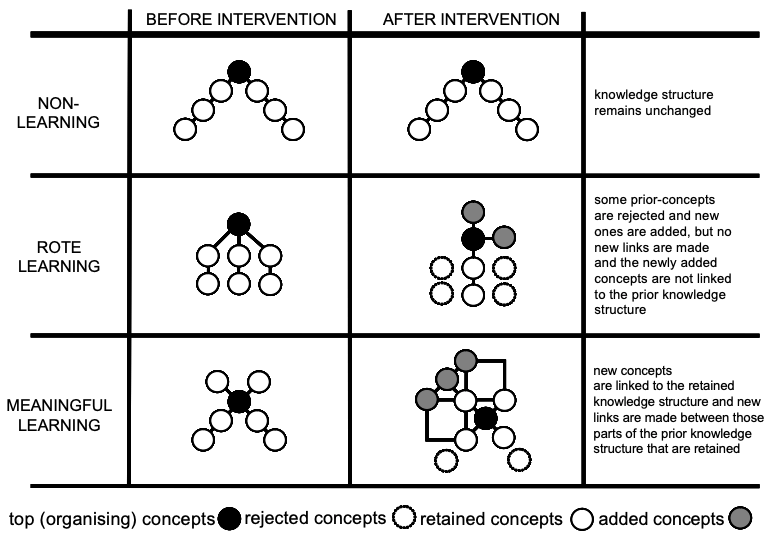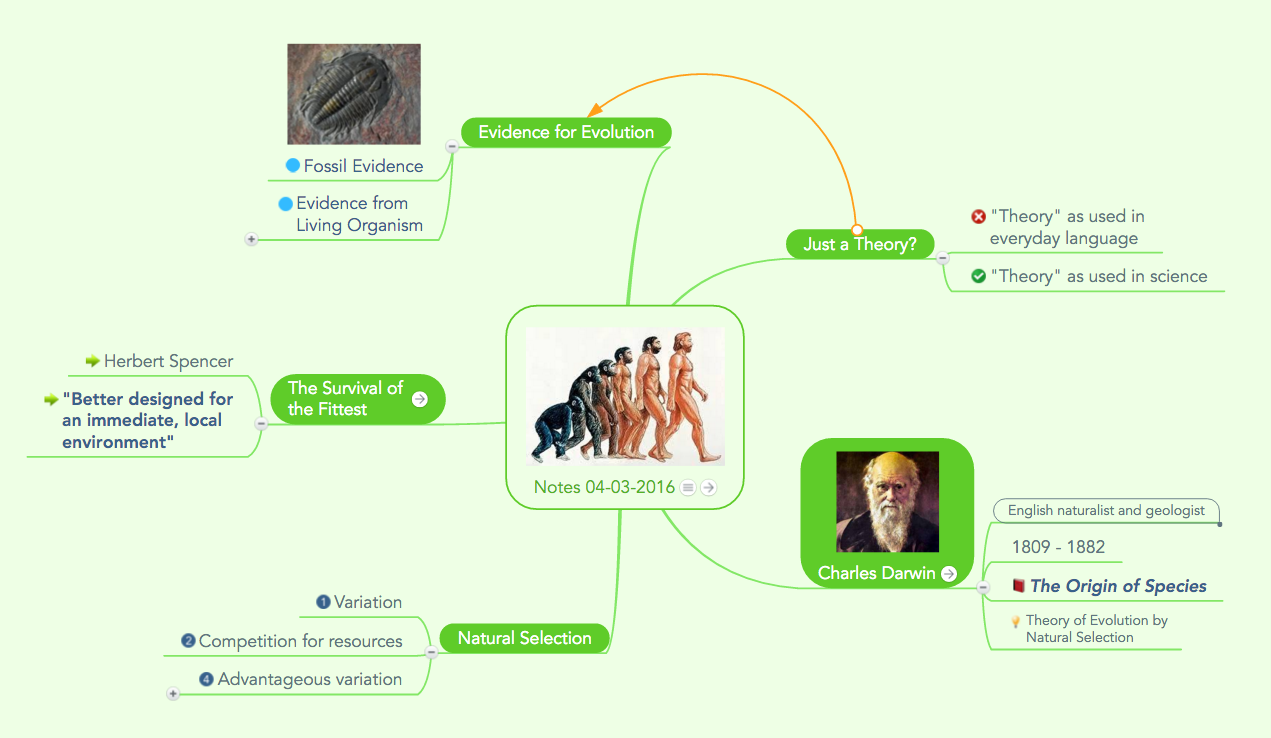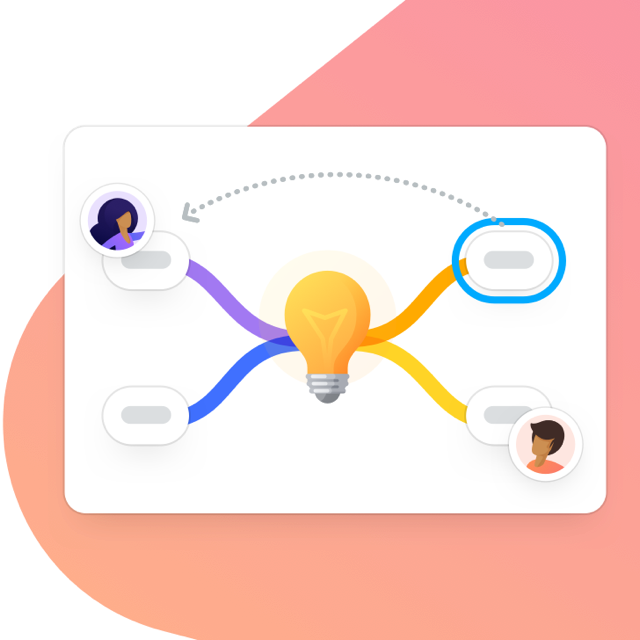If you’ve ever built a mind map, you might have experienced some of the benefits of the exercise. Maybe the visual nature of a mind map helped you recall information better. Maybe the simplicity of mind mapping allowed you to capture your ideas more quickly.

These are both benefits that our customers here at MindMeister cite frequently, but for this article, we were more interested in learning what the research says about the benefits of mind mapping. So we dug into a variety of survey results and studies to find out.
Here’s what we learned.
7 Research-Backed Benefits of Mind Mapping
We looked at a variety of surveys and research studies to find the seven biggest benefits of mind mapping. According to research, mind mapping improves learning, information recall, productivity, creativity, and more.
1. It Enables Meaningful Learning
In “Making Learning Visible: The Role of Concept Mapping in Higher Education,” researchers define three levels of learning:
- Non-learning is used to describe a state where there’s no measurable difference between a student’s knowledge before and after being taught new material.
- Rote learning is used to describe when new knowledge is learned but not connected to any existing knowledge a student has on the subject.
- Meaningful learning is used to describe when students have acquired new knowledge and have connected that new knowledge to knowledge they already had.
The researchers define meaningful learning as change, which is “a consequence of the integration of new material and the prior knowledge structure.”
The researchers assert that mind mapping helps to create this meaningful learning because it forces students to find connections between new learnings and existing knowledge.
By mapping disparate pieces of knowledge around a central topic, students can form connections between what they already know and what they’ve just learned, an exercise that leads to meaningful learning.
2. It Helps with Memorization and Retention
These days, we have tools like printing presses, home printers, word processors, ball-point pens, and the internet—tools that all make it easy to document our thoughts on paper. But these tools have not always been as readily available as they are today.
Back when writing things down was much more expensive and time-consuming, Greeks and Romans used a visualization technique called loci to memorize and recall information. Essentially, they would develop mental visuals for the things they needed to remember, allowing them to recall large amounts of information—such as an entire speech—at will.
Mind mapping is a similar technique to loci, and as W. Martin Davies writes in his study “Concept Mapping, Mind Mapping and Argument Mapping: What are the Differences and Do They Matter,” it provides the same benefits for memorization and information retention.
“Diagrams are more easily stored in memory than other kinds of representational formats,” Davies writes. “Maps allow the separate encoding of information in memory in visual and well as propositional (written) form.”
In another study—“The Efficacy of the Mind Map Study Technique”—researchers found that studying with mind maps helped boost retention by 10-15%.
3. It’s a More Engaging Form of Learning
Davies also argues that “meaningful engagement is a critical factor in promoting deeper learning.” Unfortunately, some of the most common learning methods—such as listening to a lecture or reading a textbook—do not create meaningful engagement.
@mindmeister thank you for helping me teach scientific vocabulary in a more meaningful way! Collaboration and Concept mapping of anatomical term builders. @TCCHS_tccentral pic.twitter.com/n2j694Splu
— Ms. Brumbelow (@MsBrumbelow) September 11, 2019
Mind mapping, on the other hand, does create meaningful engagement because learners actively engage in the process of brainstorming, generating ideas, and connecting concepts together while reviewing and developing mind maps.
In addition to recommending that teachers use mind maps in the classroom while teaching, Davies suggests having students create mind maps of their own that can be used to assess learning—and to compare their mind maps with those of their classmates for additional meaningful learning activities.
4. It Makes Complex Issues Easier to Understand
Every two years, Chuck Frey of Mind Mapping Software Blog conducts a survey to uncover the use cases for and benefits of mind mapping in business.
In his 2017 survey, most respondents said that the biggest benefit of mind mapping is that it helps them form an “improved understanding of complex issues.”
This makes a lot of sense when you consider some of the tasks where respondents report using mind mapping the most: more than half of respondents use mind mapping for project management and knowledge management, and nearly 40% use it for strategic planning.
There are few things in business that are more complex than planning major projects, developing a searchable knowledge base of company assets, or creating strategic plans for the future of a company. But the survey results show that mind mapping simplifies these complex tasks:
- 92% of respondents said that mind mapping helps them “distill information and reach clarity faster”
- 83% said mind mapping helps them “share their ideas with greater clarity and impact”
- 81% said mind mapping helps them “manage projects more efficiently”
- 67% said it helps them “identify the root causes of business problems”
And when Frey asked respondents “Does your mind mapping software enable you to tackle more complex tasks and projects that you would have previously avoided?” 67% said yes.
5. It Improves Your Productivity
Another takeaway from Frey’s survey was that one of the biggest benefits of mind mapping is that it boosts your productivity. Frey writes:
On average, mind mapping software helps busy executives to be 20-30% more productive in their work.
That finding, he says, has been consistent across every survey he’s conducted in eight years.
16.7% of the respondents to Frey’s survey say that mind mapping saves them 7+ hours a week. Another 30.7% say it saves them 3-7 hours per week, and 41.4% say it saves them 1-3 hours per week.
6. It Ignites Your Creativity
The final takeaway we’ll share from Frey’s survey on the benefits of mind mapping is that respondents said it helps them increase their creativity. In fact, beginner and expert users alike said that mind mapping provides them with a 50% increase in creativity.
This is a benefit we hear a lot from our customers at MindMeister, too:
I know a lot of people already do this but working with Mindmaps really helped me sort my thoughts and make great connections for creative projects. @mindmeister is STILL my go-to-tool for that, even after 10 years. Great work everyone!
— Julius Koroll (@juliuskoroll) November 29, 2018
According to Mark Dykeman, mind mapping helps ignite your creativity because you can “get your ideas on paper as quickly as possible, and “you can empty out your head when inspiration strikes.”
I cannot believe the progress on my #Horror novel #IAmWriting.
Every time I get a scene I throw some notes into my @MindMeister map. Now the scenes are starting to order themselves into sublevels, and eventually, chapters.#HorrorNovelAlice pic.twitter.com/PovhpJqjwF
— Alice Asgaard (@AmazonAutism) June 9, 2019
7. It Improves Your Writing
In a 2009 study, researchers looked at the writing of two groups of students. One group received traditional in-class writing instruction with textbooks and lectures. The second group received this instruction as well as mind mapping software that they were instructed to use for each writing assignment.
While researchers wrote that there were no significant differences between the writing skills of the students in either group from a writing test that was administered before the research began, notable differences were observable after the instruction was complete.
The study found that students in the group that used mind mapping software “made higher gains in writing achievement as a result.” Their results “showed more relevant details and better organized and connected ideas than paragraphs written by the control groups.”
The Biggest Mind Mapping Benefit Is Its Flexibility
You’ve seen from the benefits listed above that there are no limits to what mind maps can be used for, and mind mapping benefits people of all ages. Anyone from first-graders to CEOs can use and benefit from this versatile technique. Here are a few examples:
- Project managers can use mind maps to present their ideas clearly to their team
- Consultants and advisors can use mind maps to visualize their clients’ situations
- Marketers can use mind maps to create campaigns and editorial calendars
Thanks for sharing. I’m a huge FAN. I also use MindMeister for my sitemap, my editorial calendar and lots of other stuff. It’s so powerful and flexible. I’m also like little brother @meistertask and the integration with the mind maps #productivity #planning
— Warwick Brown (@warwickabrown) January 17, 2019
- Writers can use mind maps to sketch out stories and character profiles
- Research teams can use mind maps to brainstorm and collaborate
- Event planners can use mind maps to organize every aspect of an event
Mind maps are great for learning, planning, and even presenting what you’ve learned and planned. They’re better than text-heavy slideshows that distract from what you’re saying but just as good as PowerPoint presentations at helping you remember what you need to say.
Getting Started With Mind Mapping
If these benefits sound good to you, MindMeister makes it easy to get started with mind mapping. Sign up for our forever-free plan to create your first mind map, or if you need help learning how to create and use mind maps, check out our free Mind Mapping 101 course.
Originally published in September 2012, this post has been completely rewritten to focus on the research-backed benefits of mind mapping.




